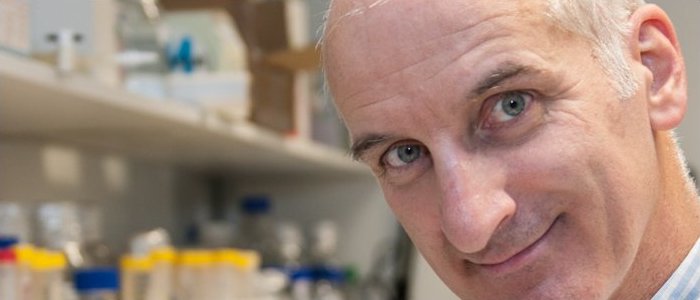Toni Aebischer

Fachgebiet 16: Erreger von Pilz- und Parasiteninfektionen und Mykobakteriosen
Robert Koch-Institut
Seestraße 10
13353 Berlin
Toni Aebischer

... is an infectious disease biologist with a broad interest in host–pathogen relationships be it at population or at molecular level. He trained as a biologist and obtained a Dr. rer. nat. in Immunology at ETH, Zürich, Switzerland in 1989, working on anti-viral T cell receptor usage. He studied anti-parasitic immunity against Leishmania spp. during post-doctoral studies at the Walter & Eliza Hall Institute in Melbourne, Australia from 1990-1993. In 1993, Toni joined the Max Planck-Institut für Biologie in Tübingen, and in 1998, the Max Planck-Institut für Infektionsbiologie in Berlin, Germany, focusing on cell biological aspects of Leishmania infections and on live vaccine development against Helicobacter pylori (moving the latter project into clinical testing). In 2006, he joined the Institute of Infection and Immunology Research at Edinburgh University, Edinburgh, UK holding a Marie-Curie Excellence Team grant to work on the cell biology of Leishmania infection and leishmaniasis vaccine development in collaboration with the groups of Debbie Smith and Paul Kaye at York University. In 2009, he got recruited to the Robert Koch-Institute (RKI) with the task of establishing a unified Parasitology, Mycology and Mycobacteriology Unit. At RKI, he established new research on Giardia duodenalis. He is Head of Unit 16, Mycotic and Parasitic Agents and Mycobacteria of the Department of Infectious Disease at the Robert Koch-Institute. He obtained his venia legendi from Humboldt University in 2019. He served terms as a member of the extended board of the Deutsche Parasitologische Gesellschaft and the National Platform for Zoonotic Research.
Research synopsis
Unit 16 at RKI is concerned with consultancy on, training in, and research into infections by eukaryotic pathogens and mycobacteria (mainly Non Tuberculous Mycobacteria) in the context of Public Health. The microorganisms studied are widespread in the environment, some are considered zoonotic, and they can cause difficult-to-treat infections in vulnerable groups, including children and immunocompromised hosts. Neglect at various levels is a common denominator that characterises the societal response to the health threat inflicted by these pathogens. Our activities aim at: i) advancing pathogen identification and diagnostic methods; ii) contributing to a better molecular understanding of virulence, pathogenicity, and drug resistance mechanisms of these pathogens; iii) exploiting the knowledge gained to expand the tool box of molecular epidemiology; iv) improving rational risk assessment and informing policy in said areas.
Giardiasis, the most prevalent of the reportable parasitic infections in Germany, is our study case for gastrointestinal infections. Giardia duodenalis is the etiologic agent and a protist parasite. To better understand its epidemiology, we are improving genotyping algorithms to serve both in molecular surveillance and tracking of etiologic agents during outbreak situations.
With respect to virulence, pathogenicity, and drug resistance, a key objective is understanding these aspects at the molecular level. To this end, we initiated biobanking projects with the goal to probe parasite populations genomically and functionally. G. duodenalis constitutes a formidable example in that context. Treatment-resistant infections are relatively common but the underlying mechanisms of drug resistance are unknown. The population structure is highly complex and, to date, only a minute fraction of this genetic diversity has been characterised functionally, e.g. in drug-sensitivity testing or assays assessing pathogenic potential comparatively. Thus, we invest into numerous readout systems and have established human intestinal organoids for analysis of human-specific gastrointestinal pathogens as a central tool in this activity.
Adhesion to intestinal surfaces is essential for Giardia parasites to establish infections and they have evolved a unique cellular organelle and mechanical device, the adhesive disk (ventral disk), involved in this. The physics of adhesion and mechanical functions of this device are not understood but knowledge about it may lead to novel intervention strategies to control infection. This is Project 1 of the SPP 2332 PoP.






